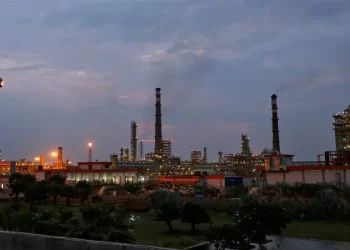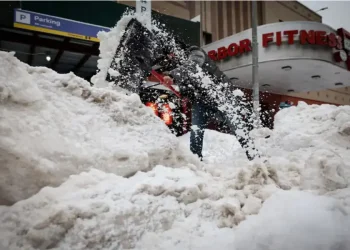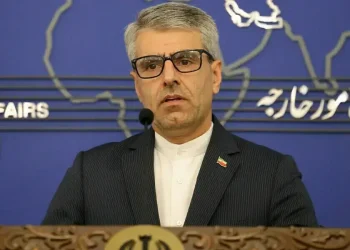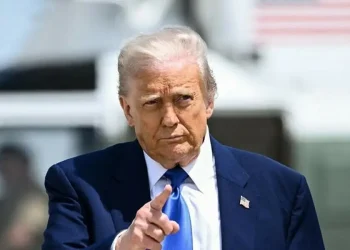CANBERRA, Australia (news agencies) — WikiLeaks founder Julian Assange returned to his homeland Australia aboard a charter jet on Wednesday, hours after pleading guilty to obtaining and publishing U.S. military secrets in a deal with Justice Department prosecutors that concludes a drawn-out legal saga.
The criminal case of international intrigue, which had played out for years, came to a surprise end in a most unusual setting with Assange, 52, entering his plea in a U.S. district court in Saipan, the capital of the Northern Mariana Islands. The American commonwealth in the Pacific is relatively close to Assange’s native Australia and accommodated his desire to avoid entering the continental United States.
Assange was accused of receiving and publishing hundreds of thousands of war logs and diplomatic cables that included details of U.S. military wrongdoing in Iraq and Afghanistan. His activities drew an outpouring of support from press freedom advocates, who heralded his role in bringing to light military conduct that might otherwise have been concealed from view and warned of a chilling effect on journalists. Among the files published by WikiLeaks was a video of a 2007 Apache helicopter attack by American forces in Baghdad that killed 11 people, including two Reuters journalists.
Assange raised his right fist as he emerged for the plane and his supporters at the Canberra airport cheered from a distance. Dressed in the same suit and tie he wore during his earlier court appearance, he embraced his wife Stella Assange and father John Shipton who were waiting on the tarmac.
He was accompanied on the flights by Australian Ambassador to the United States Kevin Rudd and High Commissioner to the United Kingdom Stephen Smith, both of whom played key roles in negotiating his freedom with London and Washington.
The flights were paid for by the “Assange team,” Deputy Prime Minister Richard Marles said, adding his government played a role in facilitating the transport.
Prime Minister Anthony Albanese told Parliament that Assange’s freedom, after he spent five years in a British prison fighting extradition to the U.S., was the result of his government’s “careful, patient and determined work.”
“Over the two years since we took office, my government has engaged and advocated including at leader-level to resolve this. We have used all appropriate channels,” Albanese said.
Assange’s lawyer Jennifer Robinson, speaking outside the Saipan court, thanked Albanese “for his statesmanship, his principled leadership and his diplomacy, which made this outcome possible.”
It is unclear where Assange will go from Canberra and what his future plans are. His South African lawyer wife and mother of his two children, Stella Assange, has been in Australia for days awaiting her husband’s release.
Another of Julian Assange’s lawyers, Barry Pollack, expected his client would continue vocal campaigning.
“WikiLeaks’s work will continue and Mr. Assange, I have no doubt, will be a continuing force for freedom of speech and transparency in government,” Pollack told reporters outside the Saipan court.
Assange’s father John Shipton said ahead of his son’s arrival that he hoped the iconoclastic internet publisher was coming home to the “great beauty of ordinary life.”
“He will be able to spend quality time with his wife, Stella, and his two children, be able to walk up and down the beach and feel the sand through his toes in winter, that lovely chill,” Shipton told Australian Broadcasting Corp.
The plea deal required Assange to admit guilt to a single felony count but also permitted him to return to Australia without any time in an American prison. The judge sentenced him to the five years he’d already spent behind bars in the U.K. fighting extradition to the U.S. on an Espionage Act indictment that could have carried a lengthy prison sentence in the event of a conviction. He was holed up for seven years before that in the Ecuadorian Embassy in London.
The conclusion enables both sides to claim a degree of satisfaction.
The Justice Department, facing a defendant who had already served substantial jail time, was able to resolve — without trial — a case that raised thorny legal issues and that might never have reached a jury at all given the plodding pace of the extradition process. Assange, for his part, signaled a begrudging contentment with the resolution, saying in court that though he believed the Espionage Act contradicted the First Amendment, he accepted the consequences of soliciting classified information from sources for publication.
The plea deal, disclosed Monday night in a sparsely detailed Justice Department letter, represents the latest — and presumably final — chapter in a court fight involving the eccentric Australian computer expert who has been celebrated by supporters as a transparency crusader but lambasted by national security hawks who insist that his conduct put lives at risks and strayed far beyond the bounds of traditional journalism duties.
Prosecutors alleged that Assange teamed with former Army intelligence analyst Chelsea Manning to obtain the records, including by conspiring to crack a Defense Department computer password, and published them without regard to American national security. Names of human sources who provided information to U.S. forces in Iraq and Afghanistan were among the details exposed, prosecutors have said.
The indictment was unsealed in 2019, but Assange’s legal woes long predated the criminal case and continued well past it.










 American Dollar Exchange Rate
American Dollar Exchange Rate